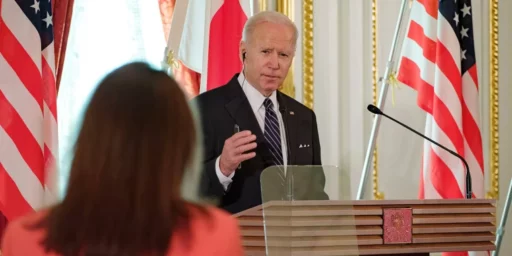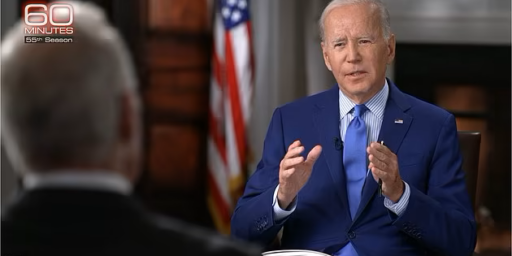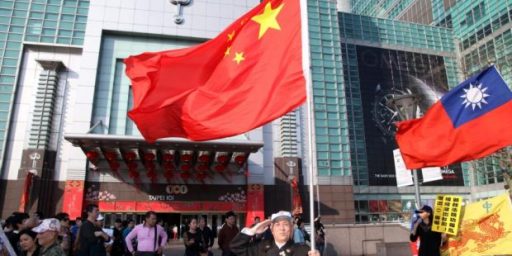Taiwan President Resigns After Opposition Wins Local Elections

Two conflicting reports from Western media:
Reuters (“Taiwan opposition wins big in local vote as president’s China threat bet fails“):
Taiwan’s main opposition party the Kuomintang (KMT) stomped home to victory in local elections on Saturday as President Tsai Ing-wen’s efforts to frame the vote as being about showing defiance to China’s rising bellicosity failed to pay off.
The elections for mayors, county chiefs and local councillors are ostensibly about domestic issues such as the COVID-19 pandemic and crime, and those elected will not have a direct say on China policy.
But Tsai, who leads the ruling Democratic Progressive Party (DPP), had recast the election as being more than a local vote, saying the world is watching how Taiwan defends its democracy amid military tensions with China, which claims the island as its territory.
The KMT was taking the lead or claimed victory in 13 of the 21 city mayor and county chief seats up for grabs, including the capital Taipei, compared to the DPP’s five, broadly in line with expectations and similar to the results of the last local elections in 2018.
Both the DPP and KMT, which traditionally favours close ties with China though strongly denies being pro-Beijing, had concentrated their campaign efforts in wealthy and populous northern Taiwan, especially Taipei, whose mayor from the small Taiwan People’s Party could not run again due to term limits.
“I have let everyone down,” the DPP’s Taipei mayor candidate Chen Shih-chung told supporters, adding he has offered his “sincere” congratulations to the KMT’s Wayne Chiang in a telephone call, and urged people to continue to support Tsai.
“I know this election’s results have greatly disappointed everyone, but we can’t despair. In the past, the DPP has lost Taipei’s elections many times, but we’ve never been defeated. We must wipe our tears and stand up again.”
China carried out war games near Taiwan in August to express anger at a visit to Taipei by U.S. House Speaker Nancy Pelosi, and its military activities have continued, though on a reduced scale.
The election took place a month after the 20th congress of China’s Communist Party, where President Xi Jinping secured an unprecedented third term in office – a point Tsai repeatedly made on the campaign trail.
The KMT has accused Tsai and the DPP of being overly confrontational with China, and focused its campaign on criticising the government’s response to the COVID-19 pandemic, especially after a surge in cases this year.
Focus will now turn to the 2024 presidential and parliament election, which Tsai and DPP won by a landslide in 2020 on a pledge to stand up to China and defend Taiwan’s freedoms.
Tsai’s second term in office runs out in 2024 and she cannot stand again as president because of term limits.
AP (“Taiwan president resigns as party leader after election loss“):
Taiwan President Tsai Ing-wen resigned as head of the ruling Democratic Progressive Party following local election losses on Saturday suffered by her party.
Voters in Taiwan overwhelmingly chose the opposition Nationalist party in several major races across the self-ruled island in an election in which lingering concerns about threats from China took a backseat to more local issues.
Tsai had spoken out many times about “opposing China and defending Taiwan” in the course of campaigning for her party. But the party’s candidate Chen Shih-chung, who lost his battle for mayor of Taipei, only raised the issue of the Communist Party’s threat a few times before he quickly switched back to local issues as there was little interest, experts said.
Tsai offered her resignation on Saturday evening, a tradition after a major loss, in a short speech in which she also thanked supporters.
“I must shoulder all the responsibility,” she said. “Faced with a result like this, there are many areas that we must deeply review.”
While international observers and the ruling party have attempted to link the elections to the long-term existential threat that is Taiwan’s neighbor, many local experts do not think China — which claims the island as its territory to be annexed by force if necessary — has a large role to play this time around.
“The international community has raised the stakes too high. They’ve raised a local election to this international level, and Taiwan’s survival,” said Yeh-lih Wang, a political science professor at National Taiwan University.
During campaigning, there were few mentions of the large-scale military exercises targeting Taiwan that China held in August in reaction to U.S. House Speaker Nancy Pelosi’s visit.
“So I think if you can’t even raise this issue in Taipei,” Wang said. “You don’t even need to consider it in cities in the south.”
[…]
Campaigns had resolutely focused on the local: air pollution in the central city of Taichung, traffic snarls in Taipei’s tech hub Nangang, and the island’s COVID-19 vaccine purchasing strategies, which had left the island in short supply during an outbreak last year.
The defeat for the ruling DPP may be partly due to how it handled the pandemic.
“The public has some dissatisfaction with the DPP on this, even though Taiwan has done well relatively speaking in pandemic prevention,” said Weihao Huang, a political science professor at National Sun Yat-sen University.
It’s hard to know what to make of the conflict. The relationship with China is always a top consideration in Taiwan’s politics and the stakes seem higher than they have in years. That said, these were ostensibly local elections, not national ones.
The resignation and abject apologies of the President for her party’s losses is a stark contrast to most Western systems, certainly our own. There is something refreshing about the sense of accountability.
UPDATE: To clarify, Tsai remains President of ROC, she’s just not party head.






Hmmm. Visa vi China, it doesn’t seem that Taiwan has any control over what China will do, beyond becoming a porcupine. If there was some middle ground in Taiwan’s relationship with China, that has disappeared and the remaining question is when will China invade and not will they.
@Sleeping Dog:
An invasion of Taiwan against US opposition is not IMO, a question of when. It would be the end of China’s expensive navy and much of its air force. It would shatter its economy. China is not a paper tiger, I imagine they are somewhat more capable than the Russian army – which, ahem, was inevitably going to take Ukraine – but China is still not the United States. China is not energy or food self-sufficient, their economy is export driven, and most of its oil and food imports and all of its product exports happen only with the forbearance of the US Navy.
China would be mad to start a war with the west. OTOH, there’s this great big, unpopulated, resource-rich space just to the north of their major population centers. China and Taiwan are like the Arabs and Israel. Inevitably the vast and growing Arab population would. . . well, finally admit defeat and start doing business.
@Michael Reynolds: I suspect you are over estimating China’s military ability. Aside from skirmishes along the Indian border, the last time the Chinese military engaged in real battles was the short war with Vietnam in 1979. Even there, the Chinese never faced the bulk of Vietnam’s regular Army, which were stationed around Hanoi. They occupied some towns in the north, said that this showed they could take Hanoi if they wanted, and after only three weeks declared victory and retreated back into China, burning and looting everything they could on the way out.
@MarkedMan:
No, I agree completely. They have zero war-fighting experience, thus no tested officers, no reliable NCO’s. And the political leadership likewise has no institutional memory of fighting wars. But they do have lots of nice new toys.
Taiwan is a convenient shiny object for the Chinese population. I understand that the CCP has been pushing that issue since forever, but I don’t believe parents out in the hinterlands think it’s worth losing their only son over. China’s got 99 problems, but Taiwan ain’t one.
@Michael Reynolds:
@MarkedMan:
Whatever the outcome, win or lose, Taiwan’s economy and community is likely to look like Europe’s at the end of WWII. The fact that China holds all the cards in a decision to invade Taiwan. It will be the Chinese who determine the risk and whether they can beat back an American response.
@Sleeping Dog:
China still cannot make high-end chips. Taiwan can, and the US is supposedly developing the capacity. China is also suffering a severe drought, a housing collapse of truly epic proportions, a demographic hole that leaves them short of soldier-aged men, and the consequences of the one child policy and confucian family dynamics that will make it damned hard to kill off a bunch of only-sons, especially in an already old and rapidly-aging population.
Add in the straits of Malacca and Hormuz, a military that has not won a war since forever and has zero practical experience, and a rigid, authoritarian government. Also, they’ve screwed up their belt and road initiative with debt traps and wolf warrior diplomacy. China is not going to overtake the United States. We have unique strengths that they lack: ports on two oceans, the ability to throw open the door and rapidly increase our worker base, the ability to print money, the most capable and experienced military on earth and long-standing relationships with eight of the ten most militarily powerful nations, ditto nine of the ten largest economies, food and energy independence, and the secret sauce: the English language, which extends our cultural influence.
China is simply not in the geopolitical or economic space to make an invasion of Taiwan anything but self-harm. They would be humiliated, as Russia has been. A failed attempt at something they’ve elevated that much, would bring down the CCP.
@Michael Reynolds: While I agree, I can’t help but wonder if the Chinese completely understand all this. The real superiority of democracy over authoritarianism is that authoritarians are prone to doing dumb things. Like invade Russia, or invade Ukraine, and I’m thinking about a book on Japan, A War It Was Always Going to Lose: Why Japan Attacked America in 1941.
There is a possibility it reflects a desire in the Taiwanese people to ratchet down the hostile rhetoric with China. It’s worth mentioning that Pelosi’s visit would not have happened if their government had discouraged it, so it wasn’t only Pelosi’s decision. The visit stirred a tiger that could’ve been left sleeping.
It is not well remembered now, but Ukraine apparently had a similar sentiment in 2019 when they elected Zelensky over his stridently anti-Russian predecessor, and Zelensky tried to end the fighting along the 2014 borders with the break away republics. Politicians tend to be somewhat fonder of war and conflict than normal folks are…until hostilities actually break out, anyway. The Ukrainians went for an actor.
@Michael Reynolds:
I don’t fundamentally disagree with any of that, but it isn’t germane, if China chooses to reject the objective reality and try and goes forward to conquer Taiwan. As @gVOR08: points out, authoritarian states lack inputs from differing points of view that can raise doubt. The best recent example is Putin, who assumed that Ukraine would welcome Russia and Zelensky would flee. Again any decision to attack Taiwan is wholly China’s. The KMT can’t have a different policy toward China than the DPP, unless that policy is to surrender.
It defies credulity that Pelosi went without the administration’s blessing. I’m certain that China was right: she went with the approval and coordination of Biden’s team, and the “private citizen” schtick was just to take the edge off.
And China was in no way sleeping. They have ramped up military and diplomatic belligerence every year of Xi’s reign. They have been creating military crisis for years now and are clearly testing to see if there will be consequences. The West needs to be sending very, very clear messages that we will respond militarily if China comes across the strait.